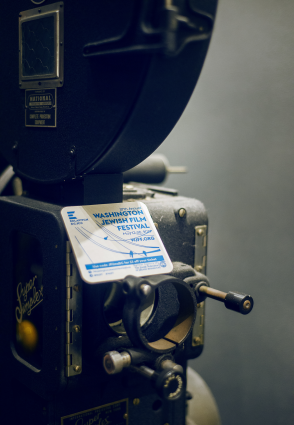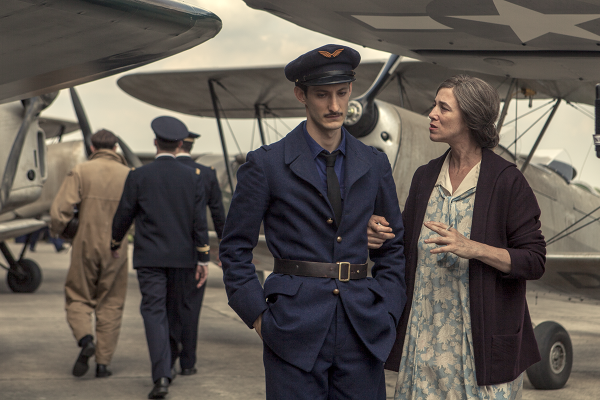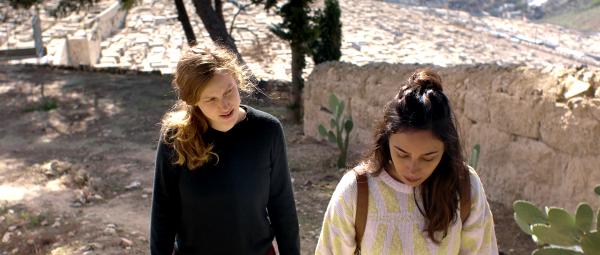Film festivals are generally discrete, occurring over a period of days or weeks. Not so the Washington Jewish Film Festival (WJFF), which is comprised of two components — a springtime festival that runs several days and a year-round, out-of-festival program of screenings.

WJFF, established in 1990 and sponsored by the Edlavitch DC Jewish Community Center’s Morris Cafritz Center for the Arts, is an international exhibition of cinema that celebrates the diversity of Jewish history, culture and experience through the moving image, said Director Ilya Tovbis. It is “one of the oldest, largest and most-respected Jewish film festivals in North America,” he added. “Only those in New York City and San Francisco are larger.”
All the films in both the actual festival and the out-of-festival program must meet “high artistic standards — in acting, direction, and production values — as well as be relevant to the festival’s mission and to introduce new cinematic voices,” Tovbis said. “These are first-rate films.”
WJFF focuses on independent and international films. Some are American-made, but the majority come from Israel and Western Europe — and occasionally Asia, Africa and Latin America. “We try to include a broad representation,” said Tovbis. The “big festival in May,” as it is known, puts greater emphasis on local filmmakers.
While Tovbis is the final arbiter about which films are included, a committee of “pre-screeners,” who spend many hours watching movies, assist him.
Between the flagship festival and the year-round program, the WJFF annually serves more than 18,000 people through 150-plus screenings, nearly all of which are regional, United States or world premieres. Most screenings are followed by discussions with guest filmmakers and subject matter experts.
The 2019 festival, coming in May, will be combined with the JCC’s annual Jewish Music Festival, “an interesting undertaking,” according to Tovbis.

Three of the films in the fall segment of the out-of-festival program will be shown at the Bethesda Row Cinema.
The first, “Promise at Dawn,” (French with English subtitles) is set for 7:30 p.m. Thursday, Oct. 18. It is based on the eponymous autobiographical novel by Romain Gary, a French-Jewish writer born in Poland. Gary became one of France’s most popular and prolific authors, writing more than 30 novels, essays and memoirs, some of which he wrote under a pseudonym.
The film, directed by Eric Barbier,features Charlotte Gainsbourg portraying Nina, Gary’s overbearing single mother, while César Prize-winner Pierre Niney plays the author. Hounding the boy at every turn — from his childhood in Poland to his adolescence in the South of France to his World War II adventures as a bombardier — Nina brags to everyone she meets that her son will become a great writer, a war hero, a French ambassador and a Knight of the Legion of Honor. He is determined to realize her ambitions.
“In 1970, American director Jules Dassin made a film by the same name, starring his wife, Melina Mercouri, and Israeli actor Assi Dayan as Gary,” said Tovbis. “But this is a new take. Gary’s autobiography is full of fantasies, so it’s hard to know what’s real and what isn’t.”

A very different film is “Red Cow” (Hebrew with English subtitles), to be screened at 7:30 p.m. Thursday, Nov. 15. This directorial debut of Tsivia Barkai Yacov tackles a teenage girl’s personal awakening against the backdrop of an East Jerusalem settlement. Benny’s mother died giving birth to her, and she was raised by her caring yet patriarchal father who is a figure of authority and mentor for many people in their ultra-religious community.
As Benny begins questioning her father’s utopian nationalism and strict religiosity, she is thrown into emotional turmoil when she meets Yael, a self-confident young woman who brings out a deep-seated longing and desire in her, Tovbis explained.
“The film has an LGBT theme as well,” he said, “but it isn’t a simple morality story and doesn’t assign blame or take sides. ‘Red Cow’ examines how much we can pass onto our children and how much are they are their own people.”
“Red Cow” was nominated for four Ophirs (Israel’s Academy Awards) and won Best Feature and Best Actress (Avigayil Kovary) at the 2018 Jerusalem Film Festival.
Last in the fall segment is “The Mossad” (Hebrew, with English subtitles), a documentary about Israel’s 70-year-old intelligence agency, which will be shown at 7:30 p.m. Thursday, Dec. 20.
The film serves as a kind of bookend to the earlier “Gatekeepers,” about Israel’s version of the CIA. The Mossad had many successes — such as the capture of the Nazi Adolf Eichmann – as well as some morally dubious actions in more-recent years.

Over its nearly seven decades of existence, the Mossad has cultivated its image as a daring, all-powerful intelligence agency for which no ‘mission impossible’ exists, Tovbis said. “For the first time, Duki Dror (whose films have been part of WJFF before) offers a peek behind the organization’s nearly impenetrable history, coaxing illuminating interviews out of 24 former spy-chiefs and operatives, who detail their clandestine operations, ethical struggles and the personal price paid in service of their nation.”
“The Mossad” weaves together archival footage with these personal accounts, presenting a look at the current challenges Israel faces, he added.
Three more films – titles to be announced — will probably be shown in Bethesda during the winter portion of the out-of-festival program.
The Bethesda Row Cinema is located at 7235 Woodmont Ave., Bethesda. For information, visit: www.wjff.org or call 202-777-3241. For tickets, e-mail boxoffice@edcjcc.org. Single tickets are $12 (plus an online service charge). A year-round film pass is available for $110; it does not cover the annual film festival.